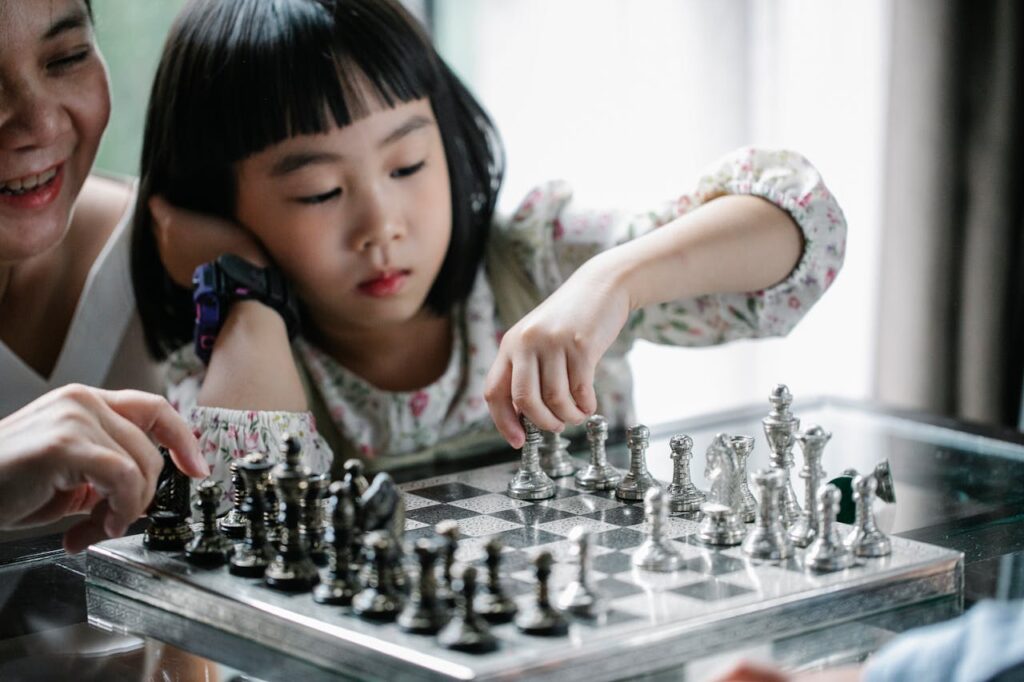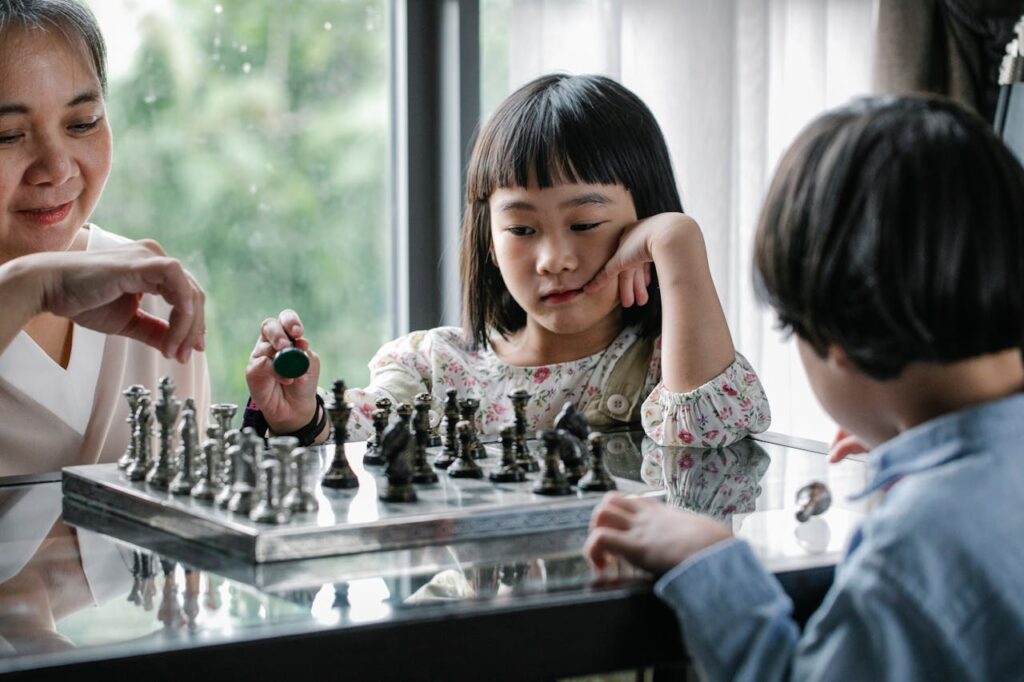Chess is more than just a game. It’s a powerful tool for learning, growth, and development. If you’re a parent wondering how to give your child an edge in life, consider introducing them to chess. This ancient game is not only fun but also incredibly beneficial for young minds. It helps children develop skills that will serve them well in school and beyond.
Chess Enhances Cognitive Development
One of the most significant reasons every kid should learn chess is the impact it has on cognitive development. The brain is like a muscle—it gets stronger with exercise.
Chess is an excellent workout for the brain, helping to enhance various cognitive skills that are crucial for a child’s development.
Boosting Memory
Chess requires players to remember the positions of pieces on the board, as well as strategies and patterns. This constant practice can significantly boost a child’s memory.
As they learn to remember past moves and anticipate future ones, they strengthen their ability to retain information.
This improved memory isn’t just useful for chess; it helps in other areas of life, too, like remembering homework assignments or studying for tests.
Memory is a foundational skill in education. Children who have good memory skills often perform better in school because they can recall information more easily.
By playing chess regularly, your child can develop a sharper memory, which will benefit them throughout their academic journey.
Improving Concentration
In a world full of distractions, teaching a child to focus is more important than ever. Chess is a game that demands complete concentration.
A single lapse in focus can lead to a mistake, and in chess, even small mistakes can be costly. As your child plays chess, they’ll learn to block out distractions and concentrate deeply on the task at hand.
This improved concentration can carry over into other aspects of life, especially in the classroom.
Children who can concentrate well are more likely to absorb information, follow instructions, and complete tasks effectively.
Chess helps train the brain to focus, making it easier for kids to pay attention in school and do better academically.

Encouraging Critical Thinking
Critical thinking is the ability to analyze situations, consider different outcomes, and make informed decisions.
Chess is all about critical thinking. Every move requires players to think ahead, weigh their options, and choose the best course of action.
Over time, this practice helps children develop strong critical thinking skills.
In today’s world, critical thinking is a vital skill. It’s not just about getting the right answer; it’s about understanding why an answer is correct and being able to apply that understanding in different situations.
Children who learn chess develop this ability naturally, which can help them excel in subjects like math, science, and even reading comprehension.
Enhancing Problem-Solving Abilities
Life is full of problems to solve, and chess is a game that’s all about solving problems. Each game presents a new challenge, requiring players to think creatively and come up with solutions.
Whether it’s figuring out how to checkmate the opponent or how to escape a tricky situation, chess helps kids become better problem solvers.
These problem-solving skills are incredibly valuable in the classroom and beyond.
For example, when faced with a challenging math problem, a child who plays chess will be more likely to approach it methodically, considering different strategies and testing various solutions until they find the right one.
This ability to tackle problems head-on and think through solutions is a skill that will benefit them for life.
Teaching Patience and Perseverance
In a world that often values instant gratification, chess teaches the importance of patience and perseverance.
The game is slow-paced, requiring players to think through their moves carefully and wait for the right opportunity.
It also teaches kids that success doesn’t come easily—sometimes, they’ll need to lose a few games before they can win.
These lessons in patience and perseverance are crucial life skills. In school, children often face tasks that require sustained effort, like studying for exams or working on long-term projects.
Chess teaches them to keep going, even when things get tough, and to stay focused on their goals. This mindset can lead to greater academic success and a more resilient attitude toward life’s challenges.
Chess as a Tool for Emotional Growth
While the cognitive benefits of chess are well-documented, the emotional growth that comes from playing the game is just as important.
Chess provides a unique environment where children can learn to manage their emotions, build confidence, and develop a healthy competitive spirit.
Building Confidence
One of the most rewarding aspects of learning chess is the confidence it builds in children.
As they develop their skills and begin to understand the complexities of the game, they gain a sense of accomplishment.
Winning a game, especially after a tough match, can be a huge confidence booster. Even when they lose, children learn that they are capable of improving through practice and perseverance.
Confidence is a critical trait for success in any area of life. Children who feel confident in their abilities are more likely to take on challenges, whether in school, sports, or other activities.
By learning chess, kids can build the self-assurance they need to tackle new tasks with enthusiasm and determination.
Developing Emotional Resilience
Chess teaches children how to handle both winning and losing with grace. In chess, losing is part of the learning process.
Every loss is an opportunity to reflect on what went wrong and how to improve. This perspective helps children develop emotional resilience—the ability to bounce back from setbacks and keep going.
Emotional resilience is essential for dealing with the challenges of life. In school, children will inevitably face difficulties, whether it’s a tough exam, a difficult project, or a disagreement with a friend.
By learning to handle defeat in chess, they also learn how to cope with these real-life challenges. They understand that setbacks are temporary and that with effort, they can overcome them.
Encouraging a Healthy Competitive Spirit
Competition is a natural part of life, and learning how to handle competition in a healthy way is an important life skill.
Chess provides a controlled environment where children can experience competition in a positive, supportive setting.
They learn that competition isn’t just about winning—it’s also about improving, learning from others, and striving to do their best.
This healthy competitive spirit can be incredibly beneficial in school. Children who learn to compete in a positive way are more likely to challenge themselves academically, set higher goals, and push themselves to achieve more.
They understand that competition is not about being better than others, but about being the best version of themselves.

Managing Stress and Pressure
Chess can be an intense game, especially when the stakes are high. Children who play chess learn to manage stress and pressure, keeping calm and focused even in difficult situations.
This ability to stay composed under pressure is a valuable skill that can help them in many areas of life.
In school, stress and pressure are common, whether it’s during exams, presentations, or sports competitions.
Children who have learned to manage these feelings through chess are better equipped to handle academic stress.
They can approach exams and other high-pressure situations with a clear mind, which can lead to better performance and less anxiety.
Chess Promotes Social Skills and Cooperation
Chess might seem like a solitary game, but it actually offers many opportunities for social interaction and cooperation.
Whether playing in a club, at school, or online, chess helps children develop social skills that are important for building relationships and working with others.
Enhancing Communication Skills
Communication is key in many aspects of life, and chess can help children develop strong communication skills.
While chess itself is a silent game, discussing strategies, sharing ideas, and reflecting on games with others are all part of the experience.
Children learn to express their thoughts clearly and listen to others’ perspectives.
These communication skills are crucial in school, where children need to interact with teachers and peers, work on group projects, and participate in class discussions.
Chess helps children become more articulate and confident in expressing their ideas, which can lead to better collaboration and understanding in the classroom.
Fostering Cooperation and Teamwork
Chess is often thought of as a one-on-one game, but it also encourages teamwork and cooperation, especially when played in a club or team setting.
Children learn to work together, share strategies, and support each other in improving their game. This sense of community and teamwork is a valuable lesson that extends beyond the chessboard.
In school, cooperation and teamwork are essential for success in group projects and extracurricular activities.
By learning to work with others in chess, children develop the skills they need to collaborate effectively in other areas of life.
They understand the importance of contributing to a team and respecting others’ ideas, which can lead to more positive and productive group experiences.
Teaching Respect and Sportsmanship
Respect is a core value in chess. Players are taught to respect their opponents, the rules of the game, and the decisions made during play.
This emphasis on respect and sportsmanship is an important lesson that children can carry with them into other areas of life.
In school, respect and sportsmanship are essential for creating a positive learning environment. Children who play chess learn to appreciate the value of fair play, whether they win or lose.
They understand that respecting others is crucial for building strong, healthy relationships, both in the classroom and beyond.
Building Friendships
Chess can be a great way for children to make new friends and build lasting relationships.
Whether they’re playing with classmates, joining a chess club, or participating in tournaments, chess provides a common interest that can bring children together.
The shared experience of learning and playing chess can create strong bonds between players.
These friendships can be especially important in school, where social connections play a key role in a child’s overall well-being.
By making friends through chess, children can build a supportive network that helps them feel more connected and engaged in their school community.

Chess and Academic Achievement
The cognitive, emotional, and social benefits of chess naturally translate into improved academic performance.
By developing skills such as critical thinking, problem-solving, and concentration, children who play chess are often better equipped to handle the demands of schoolwork.
Enhancing Math Skills
Chess and mathematics share a close relationship. Both require logical thinking, pattern recognition, and the ability to analyze complex situations.
As children play chess, they develop these mathematical skills in a fun and engaging way. They learn to calculate moves, anticipate outcomes, and recognize patterns, all of which are foundational skills in math.
For example, when a child considers how many moves it will take to achieve a certain position on the board, they’re practicing basic arithmetic.
When they analyze different strategies, they’re engaging in problem-solving similar to what’s required in math class.
Over time, these skills can lead to improved performance in mathematics, as children become more comfortable with numbers and logical reasoning.
Boosting Reading and Comprehension
While chess is often associated with math, it also has a surprising connection to reading and comprehension skills.
Chess requires players to understand and remember complex rules, think abstractly, and analyze different scenarios—all skills that are crucial for reading comprehension.
When children play chess, they practice these cognitive skills in a way that can enhance their ability to understand and interpret texts.
They learn to focus on details, make inferences, and think critically about what they’re reading.
These skills can lead to better performance in language arts, as children become more adept at understanding and analyzing literature.
Improving Focus and Attention
As mentioned earlier, chess requires intense concentration and focus. This ability to stay focused is crucial for academic success, especially during lessons, exams, and homework.
Children who play chess regularly often develop stronger attention spans, which can help them stay engaged in the classroom.
Improved focus means that children are more likely to absorb information during lessons, follow instructions accurately, and complete tasks efficiently.
This can lead to a deeper understanding of the material and, ultimately, better grades.
The discipline of focusing during a chess game carries over into other areas of life, making it easier for children to succeed academically.
Encouraging Discipline and Perseverance
Chess is a game that requires patience and discipline. Children must think carefully before making a move, considering the consequences and planning several steps ahead.
This level of self-control and strategic thinking is not only beneficial in chess but also in school.
In academics, discipline and perseverance are essential for success.
Whether it’s studying for a big exam or working on a long-term project, children who have developed these traits through chess are more likely to stay focused and see their tasks through to completion.
They understand that success requires effort and that perseverance is key to overcoming challenges.
Promoting Strategic Planning
Strategic planning is a skill that’s valuable in both chess and academics. In chess, players must plan their moves in advance, considering various possibilities and outcomes.
This strategic thinking is directly applicable to schoolwork, where children often need to plan and organize their studies.
For example, when preparing for a test, children who have learned strategic planning through chess may be more likely to break down their study material into manageable sections, set goals, and create a study schedule.
This organized approach to learning can lead to better preparation and, consequently, better performance in school.
Chess as a Lifelong Skill
One of the most compelling reasons every kid should learn chess is that it’s a skill they can carry with them throughout their life.
Chess is not just a childhood hobby; it’s a game that grows with them, offering new challenges and opportunities for learning at every stage.
Fostering a Love for Learning
Chess encourages a love for learning that can last a lifetime. As children explore different strategies and learn from each game, they develop a mindset of curiosity and a desire to improve.
This love for learning extends beyond the chessboard, inspiring them to seek out new knowledge and experiences in other areas of life.
Children who enjoy learning are more likely to stay engaged in their education, pursue their interests, and continue to grow intellectually throughout their lives.
Chess helps instill this love for learning by showing children that improvement comes through effort, curiosity, and a willingness to explore new ideas.
Preparing for Future Challenges
The skills developed through chess—critical thinking, problem-solving, focus, and resilience—are not only useful in school but also in the challenges of adult life.
Whether your child goes on to pursue higher education, a career, or any other path, the abilities honed through chess will serve them well.
In future careers, for example, the strategic thinking and decision-making skills gained from chess can help your child navigate complex challenges, make informed decisions, and achieve their goals.
The discipline and perseverance they’ve developed can drive them to work hard and stay committed, even in the face of obstacles.
Offering Relaxation and Stress Relief
While chess is often seen as a competitive game, it can also be a source of relaxation and stress relief.
Many people find playing chess to be a meditative experience, where they can focus their mind and escape from the stresses of daily life.
Teaching your child to enjoy chess in this way can give them a lifelong tool for managing stress and finding balance.
For children, learning to use chess as a way to relax and unwind can be incredibly beneficial. It provides a healthy outlet for stress and a way to clear their mind after a busy day.
This ability to relax and refocus can improve their overall well-being and help them maintain a healthy balance between work and play.
Building a Lifelong Hobby
Chess is a game that people can enjoy at any age. Unlike some activities that children may outgrow, chess continues to challenge and engage players throughout their lives.
As your child grows, so will their understanding of the game, providing endless opportunities for learning and enjoyment.
Having a lifelong hobby like chess can enrich your child’s life in many ways. It provides a source of enjoyment, a way to connect with others, and a mental challenge that keeps the brain sharp.
Whether they play casually with friends or compete in tournaments, chess can be a rewarding and fulfilling part of their life for years to come.
How to Get Your Child Started with Chess
Now that we’ve explored the many reasons why every kid should learn chess, you might be wondering how to get your child started.
Fortunately, introducing your child to chess is easier than you might think, and with the right approach, it can be a fun and rewarding experience for both of you.
Start with the Basics
The first step in introducing your child to chess is to start with the basics. Explain the rules of the game, how the pieces move, and the goal of checkmate.
Keep it simple at first, focusing on helping your child understand the fundamentals of the game.
There are many resources available, including beginner-friendly books, online tutorials, and apps that make learning chess easy and enjoyable.
At Global School of Chess, we offer beginner lessons that are designed to make learning chess fun and accessible for children.
Our experienced instructors can help your child get started on the right foot, building a strong foundation in the game.
Make Learning Fun
To keep your child interested in chess, it’s important to make learning fun. Play games together, encourage them to try new strategies, and celebrate their progress.
You can also turn chess into a game of discovery, where your child explores different openings, tactics, and endgames.
Consider setting up small challenges, like solving chess puzzles or trying to achieve checkmate in a certain number of moves.
These activities keep chess interesting and help your child develop their skills gradually. Remember, the goal is to make chess a fun and rewarding experience that your child looks forward to.
Join a Chess Club or Community
Once your child is comfortable with the basics, consider joining a chess club or community.
Playing with others is an essential part of learning chess, as it exposes your child to different playing styles and strategies.
Chess clubs offer a supportive environment where your child can learn from peers, participate in tournaments, and make new friends.
At Global School of Chess, we offer online chess clubs and lessons that provide children with opportunities to play with others, learn from experienced instructors, and participate in friendly competitions.
Being part of a chess community can enhance your child’s learning experience and keep them motivated to improve.

Encourage Regular Practice
Like any skill, becoming good at chess requires practice. Encourage your child to play regularly, whether it’s with family members, friends, or online opponents. The more they play, the more they’ll develop their skills and enjoy the game.
Make chess a regular part of your family’s routine by setting aside time for chess games or incorporating chess puzzles into your child’s daily activities.
Regular practice will help your child build confidence, improve their abilities, and deepen their understanding of the game.
Celebrate Progress and Learning
Finally, remember to celebrate your child’s progress and learning. Whether they win or lose a game, focus on the lessons learned and the improvements made.
Encourage them to reflect on their games, understand what they did well, and identify areas for improvement.
By celebrating their progress, you’ll help your child stay motivated and continue to enjoy the game.
This positive reinforcement will make chess a rewarding experience that they’ll want to continue throughout their life.
Conclusion
Chess is much more than just a game; it’s a powerful tool for learning, growth, and development.
From enhancing cognitive skills to promoting emotional resilience, chess offers a wealth of benefits that can help children succeed in school and beyond.
It teaches valuable life lessons, fosters a love for learning, and provides a lifelong hobby that can enrich your child’s life in countless ways.
By introducing your child to chess, you’re giving them a gift that will last a lifetime.
Whether they become a casual player or a competitive chess master, the skills and lessons they learn through chess will serve them well in all areas of life.

